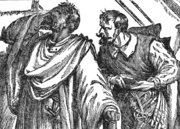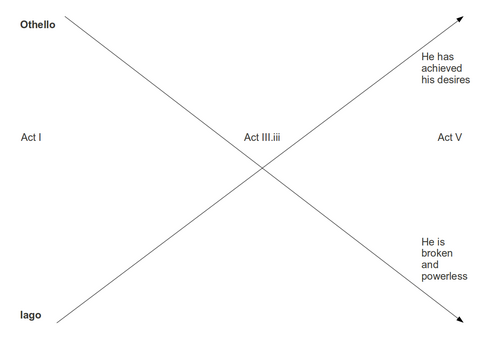Character and characterisation
| Othello: | ||
|---|---|---|
| Character | Othello | Iago | Desdemona | Cassio | |
Contents
Othello
Characterisation
Character contrast
Complete these activities to develop your understanding of how the character of Othello is developed.
| Similar | Different | |
|---|---|---|
| Othello |
|
|
| Iago |
|
Dialogue
How is Othello's character revealed through this dialogue? Include both what he himself says, but also what others say about him.
| Quotation: | What it reveals: |
| “even now, now, very now, an old black ram is tupping your white ewe.” (I.1.90) | Our initial impressions of Othello are developed through what others say about him. |
| “My services, which I have done the signory, shall out-tongue his complaints.” (I.2.19) | Othello is not afraid of admitting that he is a very good soldier, and a capable General. |
| “I fetch my life and being from men of royal siege.” (I.2.21) | Othello prefers to be known through his deeds rather than for his family. |
| “Rude am I in my speech, and little blessed with the soft phrase of peace.” (I.3.81) | Othello is modest, and has an honest opinion of his strengths and weaknesses. |
| “Send for the lady to the Sagittary, and let her speak of me before her father.” (I.3.115) | At the beginning of the play, he trusts Desdemona enough to call for her in order to help him defend himself. |
| “She loved me for the dangers I had passed, and I loved her that she did pity them.” (I.3.266) | Othello explains the reasons why he and Desdemona fell in love. |
| “Cassio, I love thee, but never more be officer of mine.” (II.3.242) | Othello shows that he is fair and just by doing something that he hates, partly because he knows that it is expected of somebody in his position. |
| “Perdition catch my soul, but I do love thee! And when I love thee not, chaos is come again.” (III.3.90) | Othello knows that he loves Desdemona so much that only a great catastrophe can separate them. |
| “For she had eyes and chose me. No Iago, I’ll see before I doubt; when I doubt, prove.” (III.3.188) | Othello is sure of the love between him and Desdemona. |
| “She’s gone: I am abused, and my relief must be to loathe her.” (III.3.264) | He feels so strongly for Desdemona that there is no middle ground. He either loves her, or thinks that he has lost her. |
| “Pish! Noses, ears, and lips! Is’t possible? Confess? Handkerchief! O devil!” (IV.1.41) | Othello is insane with jealousy, without having seen any real proof. |
| “yet she must die, or else she’ll betray more men.” (V.2.6) | Othello has developed his idea of Desdemona into that of a witch, wanting to corrupt men. |
| “I, that am cruel, am yet merciful.” (V.2.88) | He sincerely thinks that he is justified in his actions. |
| “but why should honour outlive honesty? Let it all go.” (V.2.243) | Othello realises his mistake, and admits that he has nothing left. |
| “I kissed thee, ere I killed thee. No way but this, killing myself, to die upon a kiss.” (V.2.355) | Othello tries to reconcile with Desdemona, even though she is dead. |
Iago
| Compare Iago and Othello.
Task: Construct a Venn diagram looking at character traits of these two people. Compile similarities and differences, and give a piece of evidence for each personality trait you identify. (Obviously if you identify a similarity, you will need one piece of evidence for each character to prove your point.) eg. Spend about 10 minutes getting as many character traits as you can.
|
Why is Iago the Villain?
| |
| |
| Driven by jealousy | Jealous of Cassio’s position of lieutenant, Othello marrying Desdemona | Jealous of the relationship between Desdemona and Cassio |
| Driven by money | Gets Roderigo’s money by pretending to woo Desdemona on his behalf. | He is a mercenary for the state. He uses his “talents” to advance his position. |
| Betrays a trust place in him by another | Emilia, Cassio, Roderigo, Othello and Desdemona all trust Iago blindly. | Desdemona trust her husband to believe her if her honour was every challenged. |
| Doesn’t mind destroying others to advance his own cause | Iago destroys Roderigo, Cassio, Desdemona, Othello and Emilia to advance himself. | Othello is a mercenary employed by Venice. He kills people for money, regardless of morals. |
| Kills his wife | V.ii. | V.ii. |
| Doesn’t want to be a cuckold. | Thinks Othello has done his service between his sheet. | Believes Cassio is cuckolding him. |
| Deceitful | Deceives just about everyone. | Deceives his wife and lieutenant. |
Attitudes to Women:
Task: Construct a table to display the following:
Find examples of situations where Othello and Iago refer to women in the following ways:
| |
| |
| Treat women as possessions | ||
| See them as untrustworthy | ||
| One more of your choice |
Desdemona
Cassio
| |
|
|
| Iago is jealous of Cassio because of his position next to Othello. We can therefore assume that Othello is someone to be admired and to be close to. | The respect that Othello accords Desdemona contrasts with the way that Cassio describes and acts towards Bianca. He doesn’t treat her like a possession or a toy. | Cassio idealises Desdemona and uses “jewel” imagery to describe her. This develops our understanding of Othello by showing us (i) that he must be quite an impressive man to “win” Desdemona, and (ii) that Othello doesn’t idealise her but treats her like a real person. |
| Iago: “He in good time must his lieutenant be, and I- God bless the mark- his Moorship’s ancient” (I.i.32) | Cassio: “I was the other day on the sea bank with certain Venetians, and thither comes the bauble (Bianca) and, by this hand, falls me thus about my neck (IV.1.137) | Cassio: “O behold, the riches of the ship is come on shore!” (II.i..82) |
| Cassio gets lost at sea off the coast of Cyprus. By contrast, Othello is a capable General who is off defeating the enemy. | Othello is fair, honest and just. He doesn’t allow himself to get emotionally involved in an issue, even when dearest friend, Cassio’s, future is at stake. | Cassio’s relationship with Bianca is one of Master/Mistress. By contrast, Desdemona and Othello’s match seems much more honest, honourable and true. |
| Cassio: “for I have lost him on a dangerous sea” (I.ii.43) | Othello: “Cassio, I love thee, but nevermore be officer of mine.” (II.iii.242) | Cassio: “She is persuaded I will marry her out of her own love and flattery, not out of my promise.” (IV.i.129) |
| The anguish that the people on shore show when it is said that Othello is lost at sea develops our understanding of his importance to the Venetian people. | Cassio appears to be a loyal, faithful servant. He attempts to do the right things in all situations, and this makes Othello’s actions and subsequent downfall seem all the more inexplicable. | Our understanding of the perfection of Othello’s marriage with Desdemona is developed by the praise that Cassio offers it. |
| Cassio: “O let the heavens give him defence against the elements,.” (II.i.46) | Cassio: “Whatever shall become of Michael Cassio, He’s never anything but your true servant.” (III.ii.9) | Montano: “Is you General wived?”
Cassio: “Most fortunately, he hath achieved a maid that paragons description and wild fame.” (II.i.60) |
| Cassio allows us to see the respect that people have for Othello. He is very loyal to him and is extremely distraught at losing his position. | Cassio is easily angered, and by contrast, Othello is level headed and calm in all situations. | The degree to which Desdemona is willing to argue Cassio’s case to Othello shows us how much Desdemona wants the very best for her husband. She sees his mistake and wants to correct it before it is too late. |
| Cassio: “I will rather sue to be despised than deceive so good a commander.” (II.iii.270) | Othello: “Keep up your bright swords for the dew will rust them” (I.ii.59) | Desdemona: “For thy solicitor (Desdemona) shall rather die than give thy case away.” (III.iii.27) |
| Cassio: | “I’ll beat the knave into a twiggen bottle.” |
| “Let me go sir, or I’ll knock you o’er the mazzard” | |
| Othello: | “He that stirs next to carve for his own rage holds his souls light: he dies upon his motion.” |
| “If I stir, or do but lift this arm, the best of you shall sink in my rebuke.” |
Othello’s words reflect his power, skills and experience. Even his warnings to others are almost poetic. Whereas Cassio speaks clumsily of “beating” and “knocking”, Othello is metaphorical and euphemistic, talking of “sinking” in rebuke, and holding your soul “light,” instead of openly threatening people with death. Cassio acts as a contrast to Othello, and shows us just how powerful he really is.

